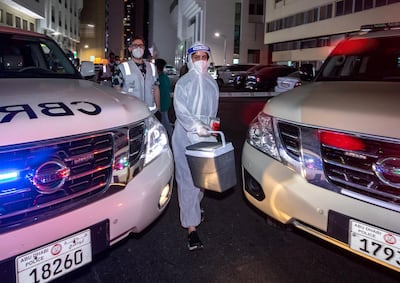Latest: Stay away from big play groups and wear a mask if a handyman visits, says top Emirati doctor
A year on from the start of the coronavirus outbreak in the UAE, a team of police and medical staff diligently scour the streets of Abu Dhabi to identify Covid-19 carriers.
For months, crews have tested up to 15,000 people every day, often working at night when they can be sure most people are at home.
The dedicated personnel have covered everywhere from the garden suburbs of Al Ain to the high-rise towers of Abu Dhabi city.
During lengthy shifts at night, medics and police must repeatedly change their protective gear and keep track of thousands of vials.
"We used to alert the people of the household or the building watchmen a day before, but now they have come to expect us," said Farha Baker, who leads mass testing for Tamouh Health Care, a government-linked company that carries out testing and vaccinations.
"They see us every two weeks and the majority of them are welcoming."
At 28, Ms Baker, a physiotherapist by training, leads a team of medics who move from street to street in a convoy of unmarked vans.
They visit people in high-rise towers, restaurants, launderettes, takeaways and more. All the tests are free of charge and the results can be viewed on Al Hosn tracing app.
The National first tagged along with the door-to-door testing team in the Tourist Club district of the capital in August as they faced the sweltering summer heat to drive down cases. At the time the team was run by a police special tactics unit.
Today, they continue that work and will do so until "coronavirus ends", Ms Baker said.
The campaign began in March last year, around Ramadan.
When medics knock on someone's door, they register each person in the home and conduct the PCR tests, which take less than two minutes.
The medics do not enter a household unless there is an elderly person or someone with special needs. Otherwise, tests are conducted in the corridor outside an apartment, or on the street if necessary.
“We don’t want people lining up and we want this to be as comfortable and safe as possible for everyone," Ms Baker said.
"Residents are asked for a small chair that is placed in front of the house and then we test each person in turn."
In recent weeks nationwide cases have dropped to about 2,200 a day – down from almost 4,000 after the Christmas and New Year holidays.
It is hoped that the vaccination campaign, restrictions on the number of people allowed in malls, shops and cinemas and isolated school closures where necessary will help to reduce the number of infections further.
The chief executive of Tamouh, Abdullah Al Rashdi, said the purpose of the drive was to screen as many people as possible.
"Daily we get information on the hot spots and depending on that we send our teams in partnership with the health authorities," Mr Al Rashdi said.
"We don't leave an area until we are sure that every single person there has been tested, then we move on to another region. Our teams are from every nationality but today their nationality is a frontliner. We will stop only after every person has been vaccinated," he said.
In Ms Baker's team, everyone has the same goal: to drive cases down to zero and help life return to normal.
“Their safety is very important to us. We change our full PPE after each visit and disinfect ourselves each time," she said.
None of the medical team has been infected with Covid-19, but the work means they spend long periods away from family and friends.
They live in hotels and are tested every two days.
“We do miss our families and they are worried about us, but if they are too worried, and you are, and I am, then who will do this job?" Ms Baker said.
"This is a national duty. It is for our mothers, our fathers, our sisters and brothers and for everyone.
"I wish my family to remain safe like everyone else and will do everything I possibly can to keep my family and country safe. Everyone is doing their part during this pandemic and if I can do this then why not?"
So many families in the Emirates live in multigenerational households, presenting the team with an acute challenge.
Older people are also put at risk when their daughters and granddaughters go to work or socialise.
“We began by testing only the elderly but then we thought that while we are there then why not test the entire household? Our elderly are at risk because their sons and daughters go out to work each day, so it is safer for them and everyone that every single person gets the test," Ms Baker said.
Every person from the age of nine is tested and the team works with police because it is often necessary to briefly close roads.
“The industrial areas and Tourist Club, now known by its new name Al Zahiyah, were the areas with the highest density," she said.
"The job requires you to be physically fit, to keep entering areas, exiting, quickly registering and swabbing. It is tiring but trust me when I tell you that it is the most rewarding job in the world."



















